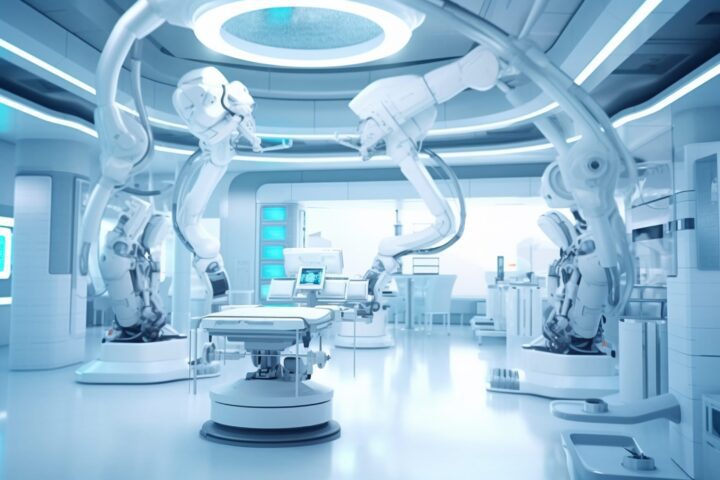Artificial Intelligence (AI) has emerged as a powerful tool that has transformed the way space exploration is envisioned. It has reshaped our understanding of the cosmos and enhanced our capabilities for discovery, analysis, and deciphering the universe’s secrets. The integration of AI with space technology has opened a new frontier, promising to shape the future of space exploration.
AI in Data Processing and Analysis
Handling Massive Data Volumes
One of AI’s significant contributions to space exploration is its ability to process vast amounts of data. Telescopes, spaceships, and rovers collect immense quantities of information, which can be overwhelming for traditional analysis methods. AI-powered machine learning and deep learning algorithms can sift through this data at unprecedented speeds, identifying patterns, abnormalities, and correlations that might otherwise go unnoticed.
AI in Space Telescopes
For instance, the Hubble Space Telescope produces breathtaking images of distant galaxies, nebulae, and other celestial objects. However, the volume of data it generates is immense. AI-powered image recognition algorithms can swiftly identify and classify celestial objects, allowing astronomers to focus on the most intriguing phenomena. This capability has led to the discovery of previously unknown star formations and has expanded our understanding of the universe.
AI in Autonomous Navigation
Overcoming Communication Delays
Long-distance space missions face significant communication delays between Earth and spacecraft. Real-time control is often impossible, making autonomous navigation a necessity. AI enables spacecraft to make immediate decisions based on observations and pre-set algorithms, reducing the need for constant human intervention while enhancing mission safety and efficiency.


AI in Mars Rovers
NASA’s Mars rovers, such as Curiosity and Perseverance, leverage AI for autonomous navigation on the Red Planet’s rugged terrain. These rovers can:
-
Identify obstacles
-
Plan alternative routes
-
Prioritize scientific targets independently
Such autonomy allows them to adapt to unexpected challenges and maximize their limited operational time. Their AI capabilities have led to groundbreaking discoveries, including the detection of organic molecules and evidence of past water flow on Mars.
AI in Exoplanet Discovery
AI and the Kepler Space Telescope
AI has played a crucial role in the search for exoplanets—planets beyond our solar system. The Kepler Space Telescope monitored thousands of stars, searching for the tiny dimming effect caused by planets passing in front of them. AI algorithms efficiently distinguished real exoplanet transits from noise, leading to the identification of over 2,600 exoplanets, some of which are potential candidates for hosting life.
AI in Astrophysical Phenomena Modeling
Predictive Modeling with AI
AI’s contributions extend to astrophysical data analysis and predictive modeling. Scientists use machine learning to model complex cosmic events such as:
-
Supernova explosions
-
Black hole dynamics
-
Dark matter behavior
By training AI systems with existing data and theoretical models, researchers can simulate and predict cosmic events, providing valuable insights that guide future observations and experiments.


AI in Space Communication
Enhancing Communication with Spacecraft
AI improves our ability to communicate with and control spacecraft. Natural Language Processing (NLP) algorithms allow astronauts and mission controllers to interact with spacecraft more intuitively. This facilitates faster and more efficient communication, reducing the likelihood of misunderstandings that could jeopardize missions.
AI in Deep Space Communication
As space missions venture further, communication delays increase. AI-driven communication systems become essential for both human and robotic explorers, ensuring seamless interaction despite long transmission times.
AI in Space Travel Risk Mitigation
Predicting and Preventing Space Hazards
AI helps minimize risks associated with space travel. For instance, it can predict and provide early warnings for space hazards such as:
-
Solar flares
-
Cosmic radiation
By analyzing real-time data, AI enables space agencies to plan missions while reducing astronauts’ exposure to dangerous conditions.
AI in Space Probes and Deep Space Exploration
Autonomous Space Probes
The development of AI-powered space probes capable of adapting to changes in deep space represents another significant advancement. These probes can:
-
Operate autonomously
-
Adjust to environmental shifts
-
Continuously gather and transmit data
This capability has the potential to revolutionize deep-space exploration, allowing us to study far-off celestial bodies more effectively.
Space exploration is a rapidly evolving field, and Artificial Intelligence is driving a new era of discovery. From processing vast amounts of data to enabling autonomous navigation, locating exoplanets, modeling astrophysical events, improving communication, and mitigating space travel risks, AI has revolutionized the way we explore the cosmos.
As technology continues to advance, AI will unlock even more mysteries of the universe, paving the way for future generations of space exploration. With each breakthrough, AI and space travel will continue to push the boundaries of human knowledge, expanding our understanding of the cosmos in ways previously unimaginable.































Keep functioning ,splendid job!